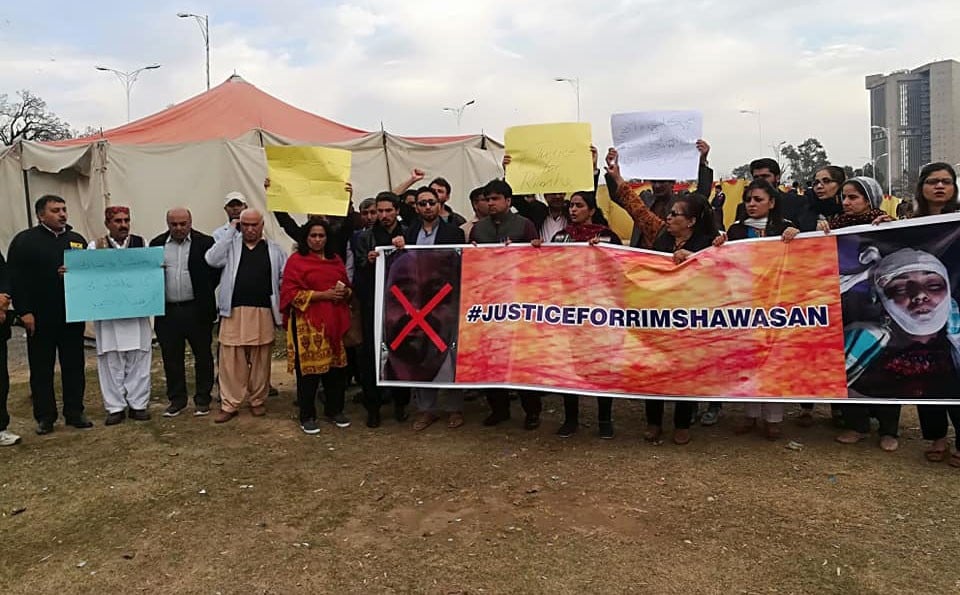
Social media has opened up new paths for activism in Sindh. Ramsha’s case of honour killing being a case in point

In a video message, Musmat Khurshid Wassan, the mother of 13-year-old Ramsha, accused Zulfiqar Wassan of kidnapping and murdering her daughter in the small town of Kunb in District Khairpur. She sought urgent help in the video that went viral, which evidently put pressure on the government officials and police to take rapid action against the accused.
Soon after, #JusticeforRamsha started trending on twitter, demanding arrest of the main accused Zulfiqar Wassan, followed by protests in many cities across Sindh, including Karachi, Hyderabad, Khairpur and Mirpurkhas.
He was arrested on Feb 6 on charges of murder, theft and kidnapping for ransom.
SSP Khairpur, Umar Tufail, agrees that Zulfiqar Wassan’s arrest was made possible only after the issue was largely debated on the social media.
The FIR records this as a case of honour killing (as Ramsha wanted to marry a boy of her own will), and states Zulfiqar Wassan instigated his friends to kill her before killing her himself and fleeing away.
According to Musmat, Ramsha was kidnapped after she rejected a marriage proposal. She was recovered with the help of a local political leader after five days. But, tragically, on the day she returned, five men entered her house and killed her.
Ramsha’s father, Pervaiz Wassan, works as a cook with the Wassan family.
Zulfiqar Wassan is nephew of former MPA Manzoor Wassan. The relationship of the accused with the MPA reopened an eternal debate on links between politicians and criminals. PTI’s member Dua Bhutto tried to move a resolution against this murder case in Sindh Assembly but was unsuccessful. She says, "The accused is backed by a local influential personality."
Member of Pakistan Peoples Party, Munawar Wassan, has expressed anger on Dua Bhutto’s allegation. "The culprit, the victim and I all belong to the same caste. But my family has no connection with anyone involved in this crime. Anyone involved in kidnapping and murder of the innocent girl should be arrested without defaming the family elders."
This is not the first time 49-year-old Zulfiqar Wassan has been criminally charged. According to SSP Umar Tufail, he has been involved "in serious cases of murder, kidnapping for ransom and terrorism over the past 25 years". Besides Ramsha’s murder, "he is accused of killing three more persons for honour but was not arrested".
The federal department of human rights has formed a fact-finding committee under the command of MNA Laal Malhi, who visited the victim’s family in Kunb. Talking to TNS, he says, judging from Wassan’s photographs with political leaders and police officers, "he has strong political influence". Therefore, despite his involvement in many "serious cases", the police are always "reluctant to arrest him" and "people are afraid of him".
In the report compiled by the fact-finding committee, Malhi suggests the formation of a JIT to investigate "who has safeguarded Wassan and why has he never been arrested".
Malhi says that when he met Ramsha’s mother, "We saw suspicious people around her house. She was terrified and said she didn’t want to stay in her house. We have asked the authorities to shift her to a safe place".
A compromise is almost always reached in resolving honour killings cases. Agha Nadia Pathan, Director Institute of Gender Studies, Shah Abdul Latif University, thinks Ramsha’s case will see the same end. "Both the families will reach a settlement. Everyone will live happily after blood money is settled. No one will think of the girl who lost her life".
She says, "People don’t feel secure. Feudal lords, involved in crimes, terrorise them. The state doesn’t offer security to them and they end up forgiving the criminals to ensure their survival."
Agha Nadia Pathan acknowledges a change is coming through social media, as "the message gets delivered to the decision-makers", resulting in quick responses "but this hasn’t reduced the number of honour killings".
As a remedial measure, the FIR in Ramsha’s case was registered on behalf of the state, "to avert pressure and threats to the victim’s family," informs the SSP.
"The registration of cases on behalf of the state will yield positive results in the near future," says researcher Nazish Brohi. "The honour killings are often done within families, and mothers, fathers or brothers file the cases. The families are often forced under social or political pressure to take their cases back but with the state becoming a defendant, it’ll reduce the chance for a compromise with the culprit."
She further adds the new law has given the state the authority to file a case against culprits of honour crimes, "this will bring a positive change in the next four to five years".
Human Rights Commission of Pakistan maintains that 737 honour killings were reported between June 2017 and August 2018. But social activists believe the numbers are grossly under-reported. "The police response to the local people has improved. FIRs are now easy to file after contacting the local SSP or SHO. But the battle is lost in the courts. That’s why no one has been punished for this form of crime," says social activist Amar Sindhu.
Advocate Zameer Ghumro thinks the courts, police and prosecutors need to be sensitised. "If prosecutor and police become sensitised, they can form a successful prosecution. Prosecution is not successful because police and prosecutor are weak, police doesn’t gather evidences and forensic samples -- thus creating loopholes in the case."
He adds that the state can become a defendant in such cases but "the witnesses are still their family members. If the witnesses won’t provide evidence, there will be no progress."
This case is second of its kind reported in Kot Diji Tehsil in the last few years. Before Ramsha, Dukia was found murdered with her body decapitated. Her husband was charged for the crime.
Amar Sindhu pursued Dukia’s case, and says that "both parties negotiated a settlement, and the case ended up in the murdakhana".